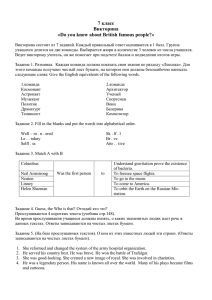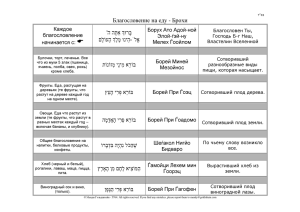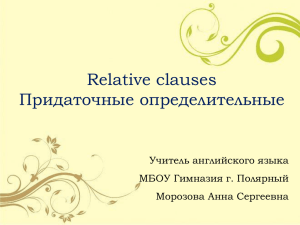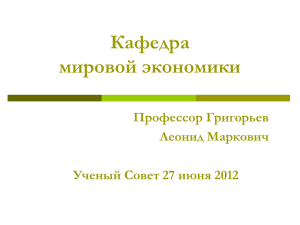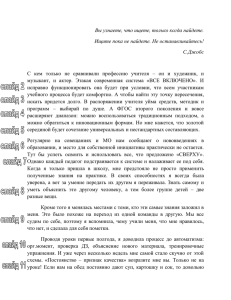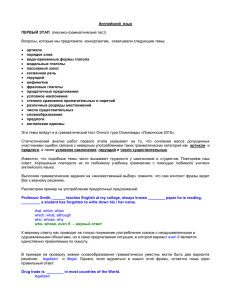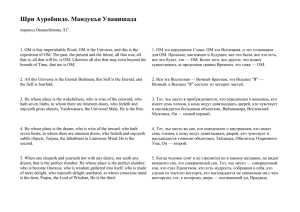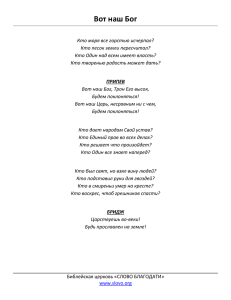2. При помощи союзных слов
реклама
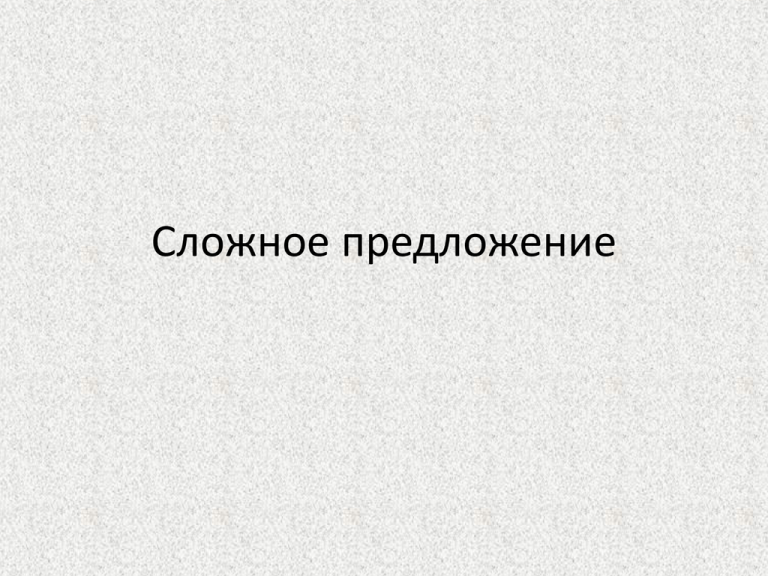
Сложное предложение • http://www.english-source.ru/englishgrammar/syntax/118-complex-sentence • Сложносочинённое (compound/coordinate) предложение Сложносочинённые предложения состоят из двух или более простых предложений, которые не связаны друг с другом и соединяются либо сочинительными союзами, либо без них. 1. К сочинительным союзам относятся соединительные, противительные и разделительные союзы (материалы "Английский союз. Основные понятия" и "Употребление союзов"). Основные из них: and и but а or или else иначе и др. I brought some food and she cooked a dish. Я принёс еды, и она приготовила блюдо. Daniel came to the cinema but the show didn't take place. Дэниел пришёл в кинотеатр, но сеанс не состоялся. 2. Без союзов Mason is not really talkative, he likes solitude. Мэйсон не очень разговорчивый, он любит уединение. • II. Сложноподчинённое предложение (dependent/subordinate) Сложноподчинённое предложение состоит из двух и более зависящих друг от друга предложений.Части сложноподчинённого предложения соединяются подчинительными союзами, союзными словами или имеют бессоюзную связь. При этом союзные слова могут играть и роль члена придаточного предложения. 1. При помощи союзов that что; чтобы after после того как because потому что и др. Ella told me that she likes knitting. Элла сказала, что она любит вязание. 2. При помощи союзных слов I didn't understand what had happened there. Я так и не понял, что там произошло. 3. Без союзов I completed the documents you had given me. Я заполнил документы, которые ты дал мне. Придаточные определительные предложения • Придаточные определительные предложения служат определением по отношению к существительному главного предложения. Если придаточное предложение относится к одушевленному предмету, то оно присоединяется к главному предложению с помощью союзных слов who, whom, that, whose. Если придаточное предложение относится к неодушевленному предмету, то оно присоединяется к главному предложению с помощью союзных слов which, that, whose. Придаточные определительные предложения также присоединяются к главному с помощью союзных слов when и where. I'll never forget the cafe where we met. — Я никогда не забуду кафе, в котором мы встретились. She couldn't remember the day when she received that letter. — Она не могла вспомнить день, когда она получила то письмо. • Придаточные определительные предложения бывают двух типов — лимитирующие и описательные. Лимитирующие описывают признаки, присущие только данному лицу или предмету и отличающие его от всех лиц или предметов того же класса, или описывают признаки, присущие данному классу лиц или предметов. Лимитирующие придаточные предложения нельзя опустить без ущерба для понимания общего смысла. В предложениях данного типа главное предложение не отделяется от придаточного запятой. • The people who live in the village get up early. — Люди, которые живут в деревне, встают рано. The film which I saw yesterday was interesting. — Фильм, который я смотрел вчера, был интересный. • В лимитирующих придаточных предложениях who и which можно заменить союзным словом that. I know the woman who speaks Chinese. — I know the woman that speaks Chinese. The people who live in the village get up early. — The people that live in the village get up early. • Если лимитирующие предложения служат определением к дополнению главного предложения, то союзные слова можно не употреблять. Yesterday I met a woman (who) we were talking about. — Вчера я встретил женщину, о которой говорили. При переводе на русский язык союзное слово необходимо. • Описательные предложения содержат дополнительную информацию об описываемом лице или предмете. Без такой информации можно обойтись. Главное предложение отделяется от придаточного запятой. • She told me about Nick, whom she liked a lot. — Она рассказала мне о Нике, который ей очень нравился. • В описательных придаточных предложениях употребляются who, which и не употребляется that. His sister, who was very beautiful, married Tom Hopkins. — Его сестра, которая была очень красива, вышла замуж за Тома Хопкинса. • http://school.xvatit.com/index.php?title=A_surprise_excurs ion._Grammar_Придаточные_определительные_предло жения Сравните: • 1) A good doctor is someone who treats sick people well. A good doctor is someone whose atients feel good. • 2) A good writer is someone who writes interesting books. A good writer is someone whose books are sold in many countries. • 3) A good singer is someone who chooses wonderful songs. A good singer is someone whose songs are liked and sung everywhere. • 4) A good engineer is someone who invents new machines. A good engineer is someone whose machines work well. • 5) A good sportsman is someone who wins championships. A good sportsman is someone whose results are always high. • 6) A good architect is someone who creates beautiful buildings. A good architect is someone whose buildings are often interesting for tourists. • 7) A good actor is someone who can play different roles. A good actor is someone whose roles are wonderful 1. Определите тип придаточного предложения и поставьте запятые там, где это требуется. Translate the sentences into Russian. • 1 • 2 • 3 • 4 • 5 • 6 • 7 • 8 The building that was next to the school fell down. Jane whose father was also a doctor works at the hospital. I'm going to the town where I spent the best years of my life. In the room I spotted a boy whose father helped me last year. There were a lot of flowers in the tree her grandfather planted. The present that he brought was the best. The girl they are talking about is Mark's sister. His brother whom I have known for many years phoned me yesterday. 2. Fill in the gaps. Use where, who, which, whose, that, when. Put in commas where necessary. 1 Most of the people ... come to this theatre are from England. 2 My brother ... picture you have seen in the room is a very nice guy. 3 His father who was very rich sent him to Eton. 4 Kate and John never forgot the place ... they met. 5 I don't read books ... have a happy ending. 6 It was a time ... men went to war and women waited for them. 3. Выберите нужное союзное слово. • 1 My friend, who / which is very talented, is arriving today. • 2 She's bought the book who / that she was looking for. • 3 I like the house who / where they live. • 4 She showed me the ring whose / which was a family treasure. • 5 I don't know the man which / who is sitting next to me. Make one sentence from two. Use which, that, whose, whom. • 1. I bought a dress. My friend advised me to buy it. 2. We went to the party. It was very interesting. 3. That is the village. We used to go there every summer. 4. This is Mary Jones. I've got a letter from her. 5. I was looking for a key. I've found it now. 6. This is the house. They bought it last year. 7. This is the actor. I like him very much. Relative clauses with “whose” • Мы употребляем whose в уточняющих частях предложения вместо his/her/their: • We saw some people. Their car had broken down. • We saw some people whose car had broken down. • • Чаще всего мы употребляем whose, когда говорим о людях: • - A widow is a woman whose husband is dead. (her husband is dead) • - What's the name of the girl whose car you borrowed? (you borrowed her car) • - The other day I met someone whose brother I went to school with. (I went to school with his brother)
